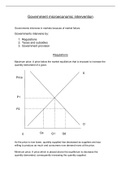Government microeconomic intervention
Governments intervene in markets because of market failure.
Governments intervene by:
1. Regulations
2. Taxes and subsidies
3. Government provision
Regulations
Maximum price: A price below the market equilibrium that is imposed to increase the
quantity demanded of a good.
S
Price
P1
P2
D
0 Qs Q1 Qd
As the price is now lower, quantity supplied has decreased as suppliers are less
willing to produce as much and consumers now demand more at the price.
Minimum price: A price which is placed above the equilibrium to decrease the
quantity demanded, consequently increasing the quantity supplied.
, S
Price
P2
P1
D
Qd Q1 Qs
Quantity
Buffer stock schemes: A type of commodity agreement to limit price fluctuations by
buying and selling goods.
Taxes and subsidies
Taxation: A fee charged by the government on a product, income or activity.
Direct taxes: Tax that is levied on income and cannot be avoided. eg. income tax,
corporation tax, national insurance contributions
Indirect taxes: Tax levied on goods and services. eg. VAT, council tax, local
government tax
Incidence: The extent to which an individual or organisation suffers from the
imposition of a tax. This may be by a producer or consumer or both.





